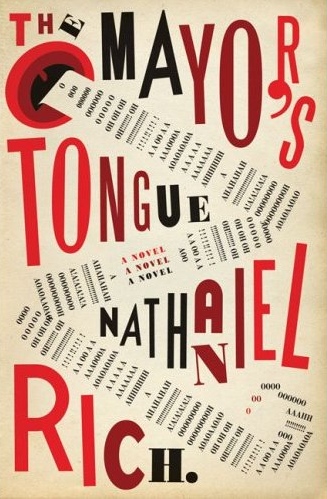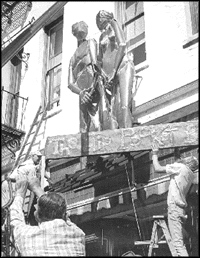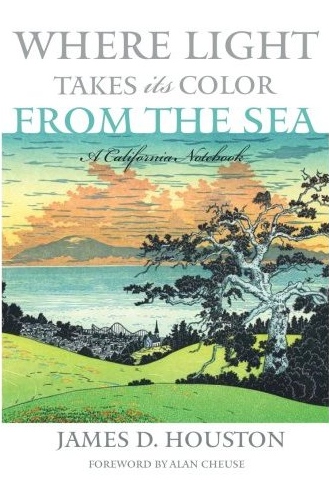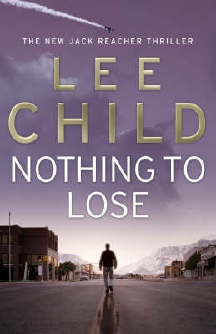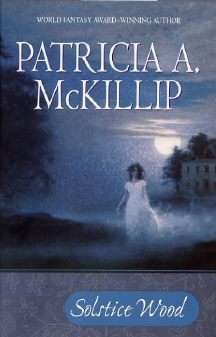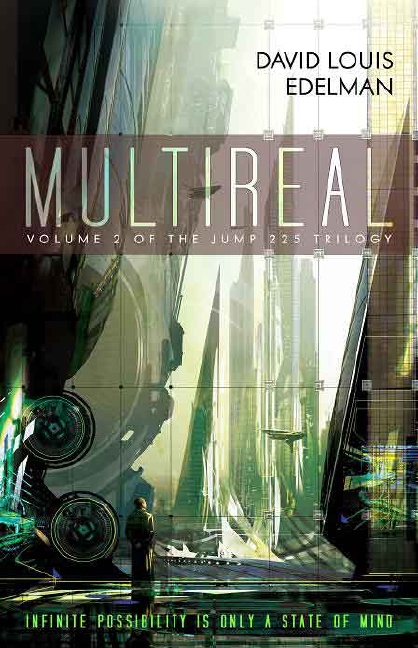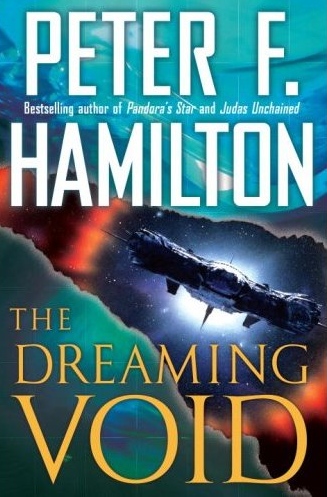|
|
|
|
This Just In...News
From The Agony Column
|
| |
|
04-25-08: Nathaniel Rich Speaks 'The Mayor's Tongue' ; Agony Column
Podcast News Report : Jeanne Wakatsuki Houston at Capitola Book Café
|
A Conscience for
Svevo
|
Esperanto
makes an appearance as well. |
Italo Svevo fans unite!
There was a bit of a foofaraw five years ago when the esteemed William
Weaver released his translation of 'Zeno's Conscience', known before that
as 'The Confessions of Zeno'. And well there should be; Svevo's work is
lively, witty, hyper-intelligent and lots of fun. Svevo's back in the
mix again, thanks to the wonderful first novel by Nathaniel Rich,
'The Mayor's Tongue' (Riverhead / Penguin Putnam ; April 17, 2008 ; $24.95).
The novel resides in the same sort of borderland the characters within
the novel inhabit; a world where the perceptions of those who experience
it will alter the terrain to both suit and undermine any expectations.
Rich eschews traditions and immerses us in two unusual narratives. Eugene
Brentani has just graduated and is actively engaged in avoiding his former
life. He's told his father that he's moved to Florida, but he's only just
moved to a different neighborhood in New York City. From working with
a moving company, he finds employment working for a scholar who is authoring
a biography of Constance Eakins, a larger-than-life Hemingway-eqsue figure
now supposedly residing in a remote Italian mountaintop village. Eugene's
a fan, and this is a dream job. Perhaps more than he expects.
Mr. Schmitz and Mr. Rutherford are lifelong friends and aging retirees
living in New York, until Rutherford hares off to Italy. Schmitz becomes
increasingly concerned as Rutherford's letters become increasingly strange.
His friend seems to have escaped into a dream world of mental illness,
and Schmitz will have to journey to Italy to find him.
Rich lays out each story in impeccable style, with an understated humor
and a surreal sensibility. Since we're in Italy, we do get to hear Svevo's
name pop up and not just in the name of Mr. Schmitz. (Svevo's real name
was Ettore Schmitz.) 'The Mayor's Tongue' is a book that is rich in strange,
as well as rich and strange. Rich successfully eludes your expectations
and offers snippets of fairy tale, post-modern academic satire, and most
importantly, characters we love to encounter. Fans of Svevo will be delighted,
as will anyone who likes elements of the fantastic seamlessly integrated
into a delightfully droll exploration of that borderland between fiction
and reality. How many people do you know who have a "Truth turns
to fiction" button? How often do they lean on it and how heavily?
Rich's novel is an hilarious and poignant exploration the land of lies,
the land that lies between our eyes, the land we create every time we
see something and apprehend a vision. We take charge and make it our own,
even if in doing so we change it beyond recognition. We dont often
realize that we ourselves change beyond recognition.
|
Agony Column Podcast
News Report : Jeanne Wakatsuki Houston at Capitola Book Café
: The Hip Pocket
|
The
last hurrah of the Hip Pocket. |
The event for James
D. Houston at Capitola Book Café was a star-studded affair,
and not surprisingly, one of the most entertaining stars was Jim's wife,
Jeanne Wakatsuki Houston. I was fortunate enough to get a few minutes
with her – long enough for her to tell the
story of The Hip Pocket bookstore in this MP3 interview. You'll see
why this couple is a national treasure. Preserve them and buy their books
– and tell them I sent you.
|
| |
|
04-24-08: James D. Houston Lives 'Where Light Takes Its Color From the
Sea' : Agony Column Podcast News Report from Capitola Book Café
|
James D. Houston
Toasts Santa Cruz
|
...and
where the author(s) live. |
Wherever you live,
consider yourself lucky. Every place has a charm; every place has a story.
But I must admit that not every place has a story teller, and
certainly few have storytellers of the caliber of James D. Houston.
In 'Where Light Takes Its Color From the Sea' (Heyday Books ; April 1,
2008 ; $25.95), Houston immerses the reader in this place, Santa
Cruz, California and its environs. Collecting essays and fiction from
40 years of writing, 'Where Light Takes Its Color From the Sea' offers
readers a swirling sense of place, a precise and poignant look at the
people as well as the landscape.
Alan Cheuse (NPR
book reviewer, author of 'The
Fires', interviewed
here) writes the forward, bringing you literally to Houston's doorstep.
Houston divides the book into four sections; "Habitat", essays
on Santa Cruz and the world beyond our doorsteps; "Kinship",
stories of his family, his history, the place that he himself defines;
"The Writing Life", essays about writers who have defined both
places and writing itself as a place to be; and "Some Fiction".
The book is a journey from one kind of truth to another, from one place
to another.
Houston has a knack for seeming simplicity that evokes unfolding complexity.
He writes with the casual candor of a neighbor greeting you as you leave
for work, but in that easygoing hello and goodbye embodies years of acquaintance
with the places he visits, the scenes he describes. Subtitled "A
California Notebook", this volume may address a small coast town
with a roller coaster and a pier, but each essay unpacks another facet
of this state, this country, the places we live and want to live. Of course,
Houston only makes it look simple and easy; but this is the sort of ease
that comes with a life of writing.
Though 'Where Light Takes Its Color From the Sea' is a California book
through and through, Houston himself is not a descendent of Californians.
You can sort hear this in his powerful voice; he's just a little too deep
to have originated here, and the essays in "Kinship" pursue
his past, journeying back east into Carolina, Tennessee, the Appalachians.
He offers conflicting stories from his forbearers, contradictory tales
that speak to the import of story in our lives. Houston's musings lead
readers back to their own families and their own lives.
From the get-go, Houston was a writer, and his essays in "The Writing
Life" reflect on his friendships with Raymond Carver and Wallace
Stegner. The casual complexity of his prose enables him to reach deep
while staying clear, to take readers into the hearts of those who have
created our world in words. The four short stories that conclude the book
are so much in Houston's voice, so much of a piece with what has preceded
them, that the ring of truth seems bell-like, liquid. We are in a place.
As Houston is a Santa Cruz resident now, through and through – though
he's also a man who can observe the world with the quiet aplomb of a studied
traveler (he's that as well) – he celebrated the release of this
book with a party in the Capitola
Book Café. The cover of Houston's collection was done by artist
Tom Killion. Like Houston, Killion evokes the beauty
of the world in the coast of California. There's a certain "Floating
World" feel to his delicately etched images; you
can find plenty of them on his website, a time-sink of the first order.
I spoke with Houston before the event; you
can hear our brief interview here. We're lucky to have Houston as
a chronicler of our world. If the world becomes as Santa Cruz, the world
itself is lucky.
|
| |
|
04-23-08: Terry D'Auray Reviews Lee Child's 'Nothing to Lose' ; Agony
Column Podcast News Report : Patricia A. McKillip Reads at SF in SF
|
Arresting Novel
Just in time for summer
– even though we're freezing cold here in Santa Cruz – Terry
D'Auray has managed to scare up an ARC of the forthcoming Jack Reacher
novel from Lee Child, 'Nothing to Lose'. From the sound
of it, we have everything to lose if we're not reading Jack Reacher novels,
and Child's latest appears to be no exception.
This time around it appears we're in for a nicely-turned story involving
Homeland Security, words that you dont really want to enter your
personal life. Here's
a link to Terry's review, which you'll find to be as entertaining as the
book she's reviewing – but much shorter.
You'll also find that in this case, one thing truly does lead to another.
|
Agony Column Podcast
News Report : Patricia A. McKillip Reads at SF in SF : 'The Bell at
Sealey Head'
|
|
Recent
and wonderful from McKillip. |
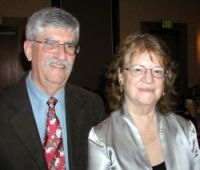
|
|
|
David Lunde and Patricia McKillip at SF in SF. |
Continuing on with
the podcasts from SF in SF, today we have Patricia A. McKillip
reading from her forthcoming novel, 'The Bell at Sealey Head'. McKillip
has such a powerfully poetic voice that it comes as no surprise she's
married to SF (science fiction) poet David Lunde. Any chance to preview
one of her gorgeously crafted novels is not to be missed.
But for me, what really stood out in her reading was the humor in her
work. When I read her prose, I'm more caught up in the musical nature
of her writing. Hearing her read aloud, the generous and very funny humor
stands out. It did for the audience as well. Here's
a link to an MP3 that will transport you to another world – no passport
required.
|
| |
|
04-22-08: David Louis Edelman Gets MultiReal; Agony Column Podcast News
Report : A Conversation with David Lunde at SF in SF on April 23, 2008
|
One Second Jump
for Mankind
|
Stephan
Martinerre rules OK. |
Time blurs; books whoosh
by. But I wont forget the 2006 Worldcon, when my wife and I drove
David Edelman from Anaheim to NPR
West to record an interview
for my Economic
Genre Fiction Report for NPR. The sky was a bright grey-blue-white
and the freeway was still blindingly new and relatively empty. There was
a time when I knew the freeways of SoCal well; no longer. Books whoosh
by.
And here we are in Spring of 2008 and I'm looking at an ARC for 'MultiReal'
( Pyr / Prometheus ; July 2008 ; $15), the second installment in the Jump
225 Trilogy, arriving just in time to help ring in yet another corporate
takeover of America with the blessings of electronic vote fraud. Edelman's
vision of a corporate future seems ever more relevant as each day goes
by and another electronic gadget becomes indispensable – and makes
us all just a little (or perhaps a lot) more vulnerable to those who manufacture
the damn things. Edelman imagines a future where pervasive technology,
the titular "MultiReal" offers great power. But with great power
comes great vulnerability.
Having squeaked past the Defense and Wellness Council, Natch, the wolf
in wolf's clothing sort-of hero of 'InfoQuake' now finds himself struggling
against the good ol' enemy within. Expect high-tech backstabbing and a
complete annihilation of any moral values you might have thought vaguely
worthwhile. This is your chance to watch corporate sharks devour one another
against the backdrop of a well-conceived futuristic landscape. As the
real-world economy circles the Big Swirly, what cold be more exciting
and relevant than to read about what happens some mumble-hundred years
afterwards? Edelman lets readers gaze up the drainpipe.
Let's not forget to mention the slick cover by Stephen Martinierre and
the decently priced trade paperback format courtesy publisher Lou Anders
of Pyr, as well as the extensive Appendices and catcher-uppers that Edelman
so thoughtfully supplies. I hope the time that passes between the release
of 'MultiReal' and the final book in the series goes by just as swiftly,
but perhaps offers fewer glimpses of the coming (or recently passed) Apocalypses.
|
Agony Column Podcast
News Report : A Conversation with David Lunde at SF in SF on April 23,
2008 : SF Poetry
Today's podcast is
the first from last weekend's SF in SF, featuring fantasy novelist Patricia
McKillip and SF (as in Science Fiction, not San Francisco) Poet David
Lunde. I managed to chat with Lunde before the show started and
asked him about the rather esoteric world of SF poetry. Certainly it's
a growth industry. You
can hear our conversation from this MP3 Link, and find out more about
Lunde from his website. Stay
tuned, as the week proceeds, we'll hear his poetry reading, the discussion
and more.
|
| |
|
04-21-08: A 2008 Interview With Peter F. Hamilton
|
"There is no specific, set way to write"
|
Th
US hardcover, at last! Worth the wait. |
Peter F. Hamilton
is just the sort of engaging storyteller you might expect him to be. Pick
up his latest novel, 'The
Dreaming Void' (Del Rey / Random House ; March 25, 2008 ; $27.00)
and you'll be transported to a vibrant, exciting future, chock full of
action, great characters and some snazzy new ideas. You expect that from
this writer; what you wont expect is the science fantasy novel
embedded within 'The Dreaming Void'. No, Hamilton is writing a metafictional
novel; the science fantasy storyline is transpiring within a black hole
at the center of the galaxy. A delightfully fanatical religious sect wants
to poke the black hole and see if heaven springs forth; others think this
is a really bad idea. Things get blown up, escapes are made as well as
messiahs. It's just another day in the Peter F. Hamilton Commonwealth
Universe.
Hamilton's on tour in the US, and he swung by San Francisco. It took some
speedy negotiating, but I managed to inject myself into his schedule and
we had a fascinating chat about how he started writing fiction, what he
writes, how he writes and why. Here's
the MP3 link. For a guy who writes LONG books, Hamilton is admirably
elegant and succinct in conversation. We talked about not just his latest
work, but also his forthcoming work, the nature of which may shock readers
a bit – but I have to say I can't wait to tuck in. Of course, he's
got to deliver a couple more 'Dreaming Void' titles before we get there;
it's just another day's work for Hamilton to blow up the center of the
galaxy. I think that sort of entry must look great on a resume for the
right kind of job. "World Leaders Needed: Inquire Within!"
|
| |
|
|


